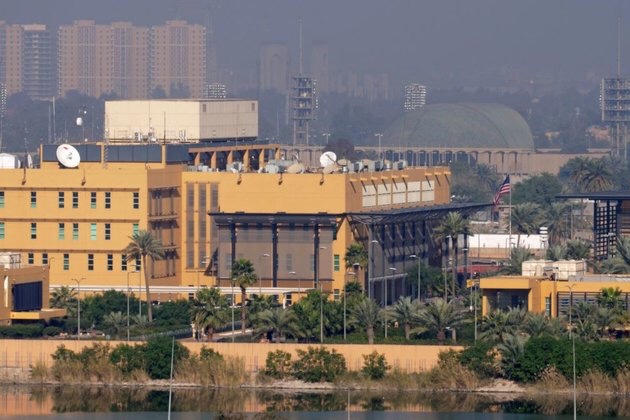
Rockets Target U.S. Embassy In Baghdad
A barrage of rockets has targeted Baghdad’s heavily fortified Green Zone, causing minor damage to the U.S. Embassy compound and residential areas in the international zone.
An Iraqi military statement said “an outlawed group” launched eight rockets on December 20 targeting the Green Zone, the location of embassies and government buildings. Most of the rockets landed near an empty residential complex and checkpoint, injuring one Iraqi security person.
The U.S. Embassy said its defense systems engaged the rockets and called on the Iraqi government to take action to prevent such attacks by militia groups.
“These sorts of attacks on diplomatic facilities are a violation of international law and are a direct assault on the sovereignty of the Iraqi government,” the U.S. Embassy said in a statement.
U.S. officials have blamed Iran-backed Iraqi militia for carrying out a string of attacks on U.S. interests in the country, prompting Washington to threaten a diplomatic and military withdrawal from the country.
Several militia groups in October announced a brief suspension of attacks on U.S. interests on condition that a timetable would be presented for U.S. forces to leave Iraq. That truce came to an end on November 18 with a rocket strike on the U.S. Embassy.
The United States confirmed in early December it was partially withdrawing some staff from its embassy in response to rising tensions with Iran and Iraqi militia groups.
U.S. officials say the temporary staff reduction came ahead of the first anniversary of the U.S. strike that killed Iran’s top general, Qasem Soleimani, and Iraqi militia leaders outside Baghdad’s airport on January 3.
Soleimani’s killing and that of leading Iraqi paramilitary figure Abu Mahdi al-Muhandis led Iraq’s parliament to pass a nonbinding resolution calling for the exit of all foreign troops from Iraq.
U.S. officials say Iran or allied militia could carry out a possible retaliatory strike around the anniversary.
Tension spiked again across the region following the assassination of Iranian nuclear scientist Mohsen Fakhrizadeh near Tehran in late November. Iran has blamed Israel and, indirectly, the United States, raising the possibility that Iran or one of its regional proxies will retaliate.
The developments in Iraq come as President Donald Trump ramps up pressure on Iran ahead of a transition to President-elect Joe Biden, who has said he will try to revive diplomacy with Iran upon entering the White House in January.
Biden is expected to try to rejoin the Iran nuclear accord that Trump quit in 2018 and work with allies to strengthen its terms, if Tehran first resumes compliance.
Western diplomats and media reports have suggested Iran has told Iraqi militia groups to avoid provoking the United States in the final weeks of the Trump administration out of concern the situation could escalate before a more dovish Biden administration comes to power.
The Trump administration in November ordered a reduction of U.S. troops in Iraq from 3,000 to 2,500 by mid-January.
With reporting by AFP, AP, and Reuters
Copyright (c) 2018. RFE/RL, Inc. Republished with the permission of Radio Free Europe/Radio Liberty, 1201 Connecticut Ave NW, Ste 400, Washington DC 20036
No comments:
Post a Comment